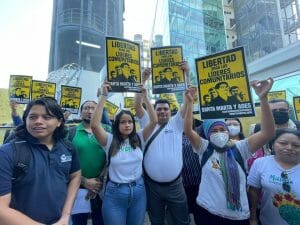NOVANEWS

Santiago Metropolitan Region – Photo: Wikipedia
Judge Leopoldo Llanos of the Appellate Court of Santiago sentenced the eight men to sentences ranging from 3 to 15 years, depending on the degree to which they participated in the crimes.
Altogether, the eight men were convicted for being responsible to varying degrees of the murders of 14 people in the northern Chilean port city of Antofagasta, some 1,100 kilometers (700 miles) north of the capital Santiago, in the weeks following the coup that that brought the military junta, headed by Pinochet, to power.
The suspects sentenced in this case carried out their crimes on October 19, 1973, just over a month after the military deposed democratically-elected Salvador Allende and took power on September 11, 1973.
The 14 victims, all political prisoners who had not been sentenced yet, were taken from the Public Jail of Antofagasta and taken to a desert ravine in the south of the city called the Quebrada Del Way where they were executed by firing squad.
The Caravana de la Muerte, or the Caravan of Death, both refers to a military operation and the group that carried the operation out. It is thought to have killed more than 100 opponents of the 1973 coup, consisting of several army officers that traveled the length of Chile, personally selecting detainees for execution and carrying out the act themselves in most instances.
The Caravan of Death got its name because the death squad would travel through Chile in a black army helicopter, visiting prisons and military bases where detainees were held. The crimes committed by this unit were considered especially heinous because the victims had turned themselves in to army officials upon learning they were wanted, and had no histories of crime or violence.
Most were also beaten, tortured, and specifically shot in areas that caused great pain but were not lethal, leaving the victims to languish until they were finally given the coup de grace. Following the executions, the victims’ bodies were buried in mass graves in rural, isolated locations across the South American country.
The men sentenced to 15 years in prison include Sergio Arredondo González, Marcelo Moren Brito, Juan Chiminelli Fullerton and Patricio Ferrer Ducaud. Pablo Martínez Latorre received a five-year sentence while Pedro Espinoza Bravo, Luis Felipe Planco Gallardo and Emilio de la Mahotiere González were all given three-year prison terms.
In addition, Judge Llanos ordered the Chilean government to compensate the widows and mothers of the victims up to 100,000,000 Chilean Pesos ($200,000) and 50,000,000 Chilean Pesos ($100,000) to each child of the victims for their pain and suffering.
The 14 victims’ names were listed, as well: Luis Eduardo Alaniz Álvarez, Dinator Segundo Ávila Rocco, Mario del Carmen Arqueros Silva, Guillermo Nelson Cuello Álvarez, Segundo Norton Flores Antivilo, José Boeslindo García Berríos, Mario Armando Darío Godoy Mansilla, Miguel Hernán Manríquez Díaz, Danilo Daniel Alberto Moreno Acevedo, Washington Redomil Muñoz Donoso, Eugenio Ruiz-Tagle Orrego, Héctor Mario Silva Iriarte, Alexis Alberto Valenzuela Flores and Marco Felipe de la Vega Rivera.
The Caravan of Death was mostly led by General Sergio Arellano Stark, the man assigned to the position by Pinochet after the latter had heard of some “soft” treatment of political prisoners by provincial garrison commanders. Since Pinochet said there will be “no mercy for extremists,” the group was tasked with visiting prisons and military bases holding political opponents not located in Santiago and Chile’s 2nd largest city, Valparaíso.
Arellano Stark, whose official title was “Officer Delegate of the Commander-in-Chief of the Army and the President of the Government Junta,” faced trial in 2008 for his role in the crimes but avoided any prison time after the legal system’s medical authorities said he suffered from progressive and incurable dementia.
Over 40,000 people were victims of grave human rights abuses in the South American country during its 1973-1990 dictatorship, including kidnapping, torture, rape, ‘disappearance,’ and murder.



